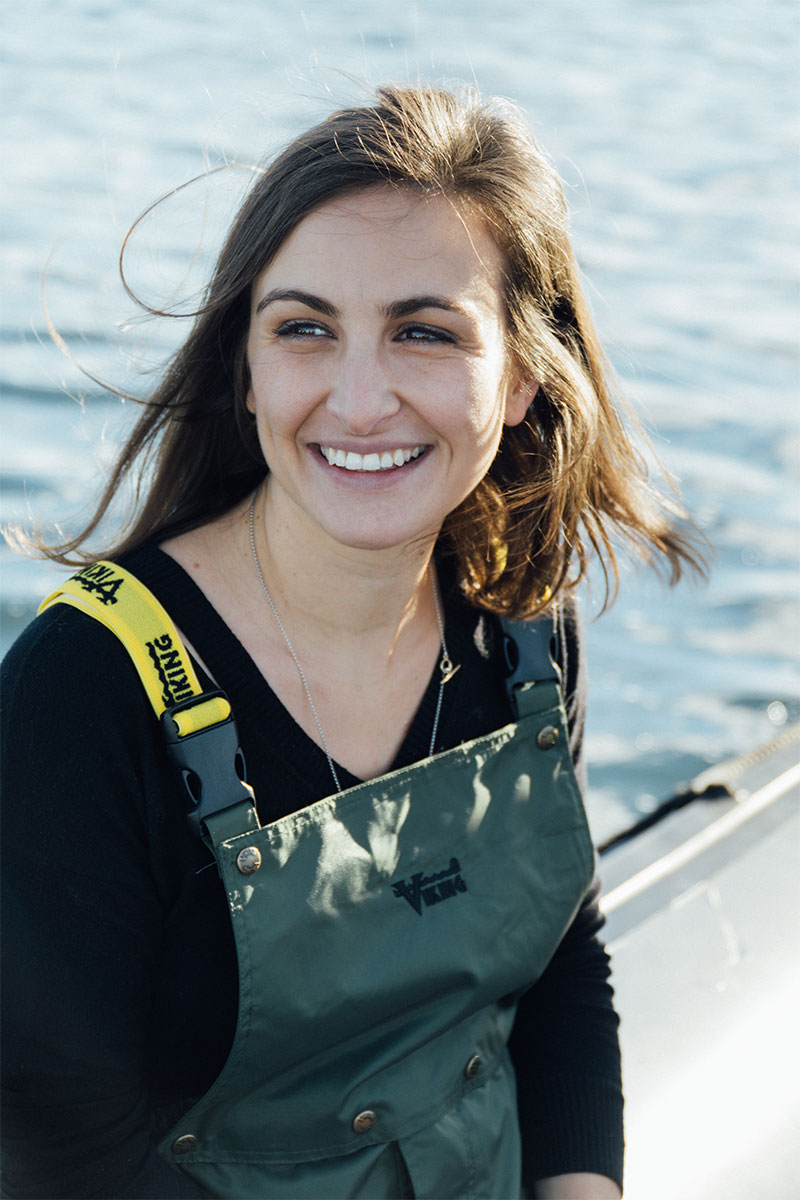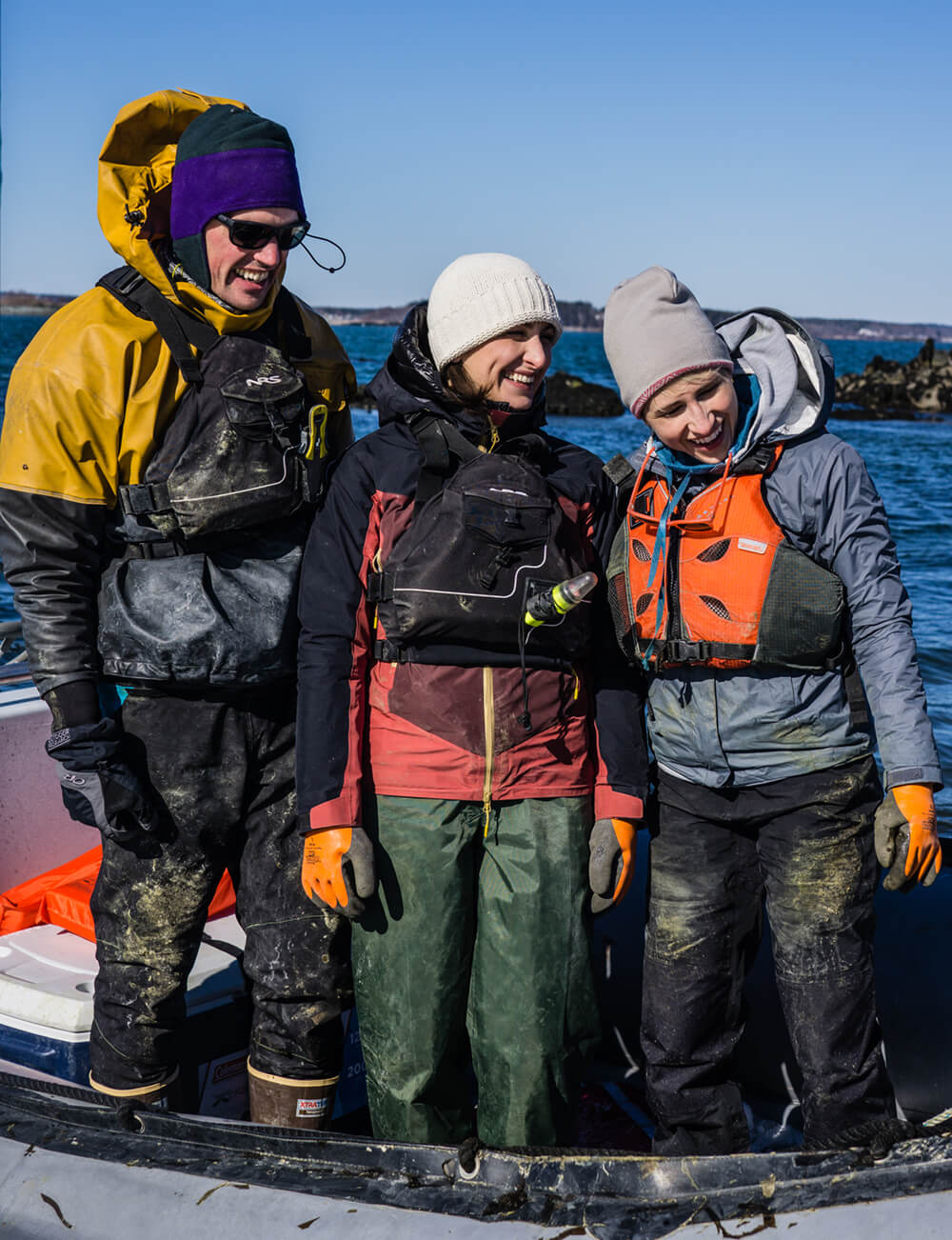Atlantic Sea Farms produces fresh and frozen sea vegetable products from Maine under the brand name Atlantic Sea Farms. Kelp, now being dubbed a “sea vegetable” rather than “seaweed”, was named by both Whole Foods and the New York Times as a top food trend for 2019.
Kelp farming produces a food that is healthy for people, healthy for the environment, and healthy for coastal communities.

Briana Warner, CEO of Atlantic Sea Farms
- Kelp is considered a “superfood” as a good low-calorie source of calcium, magnesium, potassium, and iodine, as well as other minerals and vitamins.
- Farming kelp doesn’t require fresh water, arable land, fertilizers, or pesticides. It also lowers the acidity of the water around it, while absorbing significant amounts of carbon as it grows.
- Kelp farming occurs in the off-season for lobster fishing, thereby provide incremental income opportunities for local fishermen.
Through Atlantic Sea Farms’ R&D, they create kelp sporelings in their nursery and then transfer the seeds and farming knowledge to local fishermen to seed lines of kelp in open ocean farms, along the coast of Maine, where the water is extremely clean, especially compared to the water where most of the world’s seaweed comes from today. Today, the U.S. imports more than 98% of its edible seaweed from Asia as a dried product that is often reconstituted, dyed, and flavored with artificial additives. In contrast, the Company’s entire supply is from clean and sustainably farmed kelp which also improves water quality and reduces the effects of ocean acidification locally.
Atlantic Sea Farms’ products will be served coast-to-coast in restaurants, smoothie shops, schools and hospitals. They are now managing rapid growth as they move into the retail sector and innovate on new products that help expand the market for sea vegetables in the U.S., like pre-made, all-natural seaweed salad, kimchi, and frozen cubes for smoothies.
More about Atlantic Sea Farms:
“The Climate-Friendly Vegetable You Ought to Eat.” – NY Times
“You need strategic players in the market, not just money. True Wealth has investors willing to move in new directions and into new markets. That’s what we need, because we are a niche market and first mover. It is like a marriage; you need the right partners to make it work.” – Briana Warner
CEO: Briana Warner
Headquarters: Portland, ME
Meet Briana Warner:
Background: Briana Warner has a track record of making great things happen wherever she goes. She joined Atlantic Sea Farms as the new CEO in July 2018 and sees her new venture as a natural progression of work she’s been doing for years. Briana spent her twenties working as an economic officer in the U.S. foreign service. Living abroad for over a decade in places such as Guinea, Brussels, and Libya, she used navigated difficult political and economic situations to make positive progress toward U.S. Foreign Policy goals.

James Crimp, Briana Warner, and Melissa DiPalma
Briana left the Department of State because she wanted to work with her hands, build something from the ground up, and create meaningful jobs in the State of Maine. She and her husband moved back to New England, where she founded The Maine Pie Line, a mission-driven company that specialized in hand-made sweet and savory pies made with responsibly sourced ingredients and unique flavor combinations for wholesale and retail markets. As part of the company’s mission, she hired exclusively from the refugee community in Maine, a group that is underemployed and, often, highly skilled.
With the sale of her pie company in 2014, Briana became the Economic Development Director for the Island Institute, a nonprofit in Maine that works to sustain island and coastal communities both in Maine and elsewhere. During her tenure there, she created programming to help fishermen diversify their incomes into shellfish and seaweed aquaculture to decrease coastal dependence on the lobster monoculture. Her track record of success at the Island Institute, broad industry contacts, and tenure as an Atlantic Sea Farms board observer positioned her to take Atlantic Sea Farms to the next level as its CEO.
Briana’s formal education was focused on International Relations, with a Bachelor’s Degree from The George Washington University and a Master’s Degree from Yale University. She currently also serves as a board member of the Maine Aquaculture Association and the Aquaculture Research Institute at the University of Maine, as well as being a part of the Aquaculture Implementation Team of Focus Maine.
Why did you join Atlantic Sea Farms? “As the Economic Development Director at the Island Institute, I worked with the fishing and aquaculture community in Maine – a community that has been here for generations.. The coastal area of Maine is one of the most valuable fisheries in the U.S.. These fishermen – both male and female – are small business owners with an entrepreneurial spirit. Seaweed cleans water and is easy and relatively low cost to grow. Because the growing season is during the winter and early spring – just the opposite of the lobster season in Maine – there are plenty of lobstermen who could grow kelp in the winter – and it requires a low capital investment for them to start.
My work at the Island Institute led me to Atlantic Sea Farms and my role as a board observer prior to becoming the CEO. As the previous President was leaving, my connection to the company and the industry, along with my background, made the transition easier.”
Why seek Venture Capital? “We want to take the company into new directions and capitalize on opportunities. We can help diversify the fisherman community through aquaculture, and be successful in creating products that chefs and consumers appreciate. Bringing this domestic product to market is revolutionary.”
Have you seen women general partners (GPs) bring a different perspective to the table? Do you think a woman’s perspective is valuable to this market? “Women do most of the shopping, especially in the health food and nutrition areas. Most of our kelp farmers are men, though we work with a few female fishermen – although they are still called ‘lobstermen’ – and almost all of our partner farms are run by the whole family unit. It’s good for the investors and company to have a similar outlook, and you get that with women at the table. We need to be looking not just at our bottom line next year, but also about what this industry could do for our company, our coast, and consumers ten or twenty years down the line. You get that forethought with women at the table.”
Why True Wealth Ventures? “You need strategic players in the market, not just money. True Wealth has investors willing to move in new directions and into new markets. That’s what we need, because we are a niche market and first mover. It is like a marriage; you need the right partners to make it work. Sara and Kerry have great backgrounds and networks, and are good at both financial details and business strategy. They make me excited to pick up the phone and ask questions. They are a great sounding board and I am comfortable going to them for advice.”
Words of Wisdom: “You hear a lot about women having a difficult time getting funding. You can go into it thinking it will be hard, but tell yourself ‘I’ll just kick ass anyway.’ It’s all about the frame you put on it. You need to be positive. If you get ‘preventative’ questions, you need to be bulletproof. You really need people who will help instead of obstruct, and who will be there when you need them. Take money for your business that’s going to help you – not just what’s in front of you or what is easiest.”

